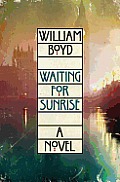Books |
Waiting for Sunrise
William Boyd
By
Published: Apr 23, 2012
Category:
Fiction
Maybe if I could just type THE END to this novel I’ve been writing and writing and writing, I wouldn’t have such trouble reading the fiction of living novelists. Or so a shrink — or my agent — might say. I might say it too, but every time I open a page at random from the pile of new fiction slowly becoming a tower in my office and try to love Famous Writer X’s latest much-praised novel, I find my eyes attacked by legions of metaphors, overwrought description and worse. No wonder these books stagger to a halt at 400 pages.
So why did I read “Waiting for Sunrise,” William Boyd’s eleventh novel?
Well, it started with a free meal — a rare event in book publishing these days — at Michael’s, the media lunchroom where I go every few weeks and toy with half a Cobb salad at $25. The author was winging in from London, and I figured, well, if he could do that, I could try to read his book.
“It is a clear and dazzling summer’s day in Vienna.” That’s how it starts. August, 1913, and Lysander Rief, a 28-year-old English actor, has come to Vienna for — what else — treatment from one of those newfangled creatures, a psychoanalyst. His problem? He’s interested in sex, but can’t have an orgasm. In the waiting room, he meets the military attaché at the British consulate. And, more to the point, he meets Hettie Bull, a free-spirited sculptor who will quickly solve his problem.
I read 100 of the novel’s 350 pages before the lunch. They were damn good, in just the way I like: story story story. At Michael’s, I had a chat with William Boyd, and found he was shockingly accessible, not at all like those too-clever-by-half Brits who favor us every few years with books so dazzling you need sunglasses to read them. Home again, I pressed on. [To buy the book from Amazon, click here. For the Kindle edition, click here.]
Lysander’s father was one of the greatest actors of his time, so you’d think that Lysander, himself no dud on stage, would be immensely cosmopolitan. But he’s curiously pure: “I want to treat Vienna as a kind of beautiful sanitorium full of perfect strangers — as if I had consumption and had simply disappeared until the cure was effected.” In other words: What happens in Vienna stays in Vienna.
The rest of the book — and this was on page 27 — shows how wrong he is about that. And how much you learn about life when, for example, a World War begins and explodes your little world. Because things happen, and fast: trouble in Vienna, a far from ordinary return to England, a pleasant interlude with an actress, and then…
And then most of the reviewers who have written about this book give away too much of the plot. Some have even mused about the ending. People, please! The point of a review is to interest readers to pick up a book you like or avoid one you loathe. It is not to make the book unnecessary.
There is a way around this trap: write about the writing. Not a chore, in this case. If you read The Hare with Amber Eyes and swooned over the Vienna chapters, you might like “Waiting for Sunrise” even a bit more. You will appreciate brief digressions, like this:
Dream. I was shaving and then in the mirror my face turned into my father’s. How are you, old son? I said. I’m well, father, I said. I miss you. Step through the mirror and join me, then, he said, come on, lad. I touched the mirror and his face turned back to mine.
Then a line space, and we’re right back in reality: “I remember an argument I had with Blanche because she’d left me a note written in pencil.”
This, I submit, is superior writing. And then the War stuff — if you are lucky enough to have read Maugham’s almost-unavailable “Ashenden” [for the large print paperback at Amazon for a ridiculous $24.95, click here], you will relish what happens when Lysander returns to England.
Is there anything wrong with this novel? Yes, but it might just be this reader. The last third of the book is either too brilliantly plotted for a tool like me or it’s a bit more complex than it needs to be. Lysander’s mother: why did she….? That other guy, was he….? Readers of mystery novels may delight in this brisk tennis. I drew a diagram and flunked.
No matter. For almost all of “Waiting for Sunrise,” I found myself sighing with pleasure. Purring, almost. And thinking, far too often, how I might cop some of William Boyd’s smooth-but-not-slick style.


